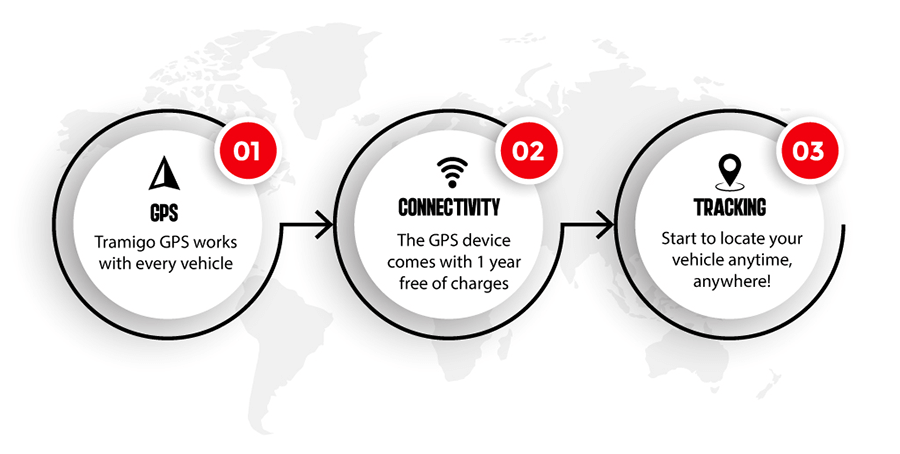The Road to Efficiency: How GPS Tracking Unlocks Fleet Success for All Sizes
Unlock the secret behind fleet success, regardless of size, as we unveil the game-changing role of GPS tracking.
Fleet management is an increasingly critical aspect of modern businesses that rely on smooth and efficient transportation operations. As technology continues to evolve, GPS tracking has emerged as a game-changing solution for fleet owners looking to optimize their operations, ensure driver safety, and enhance customer satisfaction. In this article, we will explore the numerous benefits of GPS tracking specifically tailored to diverse fleet sizes, ranging from small to medium to large.
Small Fleet Size: Making Every Asset Count
In today’s competitive landscape, small fleet owners are constantly seeking innovative ways to make the most of their limited resources. GPS tracking offers a wide range of benefits that can significantly impact their business’s efficiency and profitability.
One of the most noticeable benefits is enhanced resource utilization. Real-time tracking enables fleet owners to identify idle vehicles and reassign them to pending deliveries or service calls. By minimizing wasted time and maximizing asset utilization, small businesses can reduce their operating costs and increase the number of completed orders.
With GPS tracking, seamless dispatching and effective route optimization become a reality for small fleet owners. By having real-time visibility into their vehicles’ locations, fleet managers can make informed decisions on which driver is closest to a specific destination, thus minimizing travel time and maximizing productivity.
Unauthorized vehicle use and theft can have serious consequences for small fleet owners. GPS tracking acts as a deterrent against unauthorized vehicle usage and can assist in recovering stolen assets in the unfortunate event of theft. This added layer of security can provide peace of mind to small business owners.
Maintenance is an important aspect of any fleet, regardless of its size. However, in a small fleet, even a single vehicle’s downtime can significantly impact operations. GPS tracking allows fleet owners to streamline maintenance processes by providing real-time notifications for service requirements and monitoring vehicle health. By proactively addressing maintenance needs, small fleet owners can minimize downtime and avoid costly repairs.
Several case studies highlight the success experienced by small fleet owners after implementing GPS tracking solutions. For example, a local courier service in a metropolitan area saw a 20% increase in completed deliveries and a 15% reduction in fuel costs after adopting GPS tracking to optimize their route planning and monitor driver performance.
Medium Fleet Size: Maximizing Efficiency at Scale
Medium-sized fleet owners face a unique set of challenges in scaling their operations while maintaining efficiency. GPS tracking can provide them with the tools and insights necessary to meet these challenges head-on.
Accountability and performance management are critical factors for medium fleet owners. GPS tracking enables real-time monitoring of driver behavior and ensures adherence to company policies. By tracking driver performance, fleet managers can identify areas for improvement and provide targeted training, ultimately leading to increased safety and productivity.
Customer satisfaction is paramount for any business, and medium fleet owners can greatly benefit from the accurate estimated time of arrivals (ETAs) made possible by GPS tracking. With accurate ETAs, businesses can keep customers informed of their delivery status, manage expectations effectively, and build trust and loyalty.
Preventive maintenance is key to avoiding unexpected breakdowns that can disrupt operations. GPS tracking solutions can help medium fleet owners schedule regular maintenance based on mileage, engine hours, or specific calendar intervals. By proactively addressing maintenance needs, businesses can minimize downtime and prevent costly repairs.
Fuel consumption represents a significant expense for fleet operations. GPS tracking tracks fuel usage and provides insights into driver behavior, such as excessive idling or aggressive driving, which can contribute to increased fuel consumption. Armed with this information, businesses can educate drivers and implement measures to improve fuel efficiency, ultimately reducing costs.
Real-time reporting and analytics are valuable assets for medium fleet owners. By utilizing GPS tracking, fleet managers can access detailed reports on vehicle usage, driver performance, and fuel consumption. These reports provide valuable data for data-driven decision making, allowing businesses to optimize operations, reduce costs, and improve overall efficiency.
Large Fleet Size: Mastering Complex Operations
Large fleet owners face the unique challenge of managing complex operations involving a significant number of vehicles and drivers. GPS tracking is an essential tool in their arsenal, empowering them to tackle these challenges head-on.

Centralized fleet management becomes crucial in overseeing a large fleet effectively. GPS tracking offers a holistic view of all vehicles, allowing fleet managers to monitor their real-time locations, status, and performance from a single platform. This centralized approach improves operational efficiency and ensures seamless communication between drivers and dispatchers.
Geofencing and route deviation alerts provide large fleet owners with an additional layer of control and compliance. By establishing virtual boundaries or geofences, fleet managers can receive instant alerts if a vehicle deviates from its designated route. This feature helps maintain driver accountability and ensures adherence to predefined routes and schedules.
Optimizing dispatching capabilities is critical in large-scale operations. GPS tracking can integrate seamlessly with dispatch management systems, enabling fleet managers to assign tasks to the most suitable driver based on real-time information. This integration streamlines operations, reducing response times and improving overall customer satisfaction.
Maintaining large fleets presents significant maintenance challenges. GPS tracking assists large fleet owners in implementing proactive maintenance monitoring, which significantly reduces downtime and repair costs. By receiving real-time alerts on upcoming service requirements, large fleet owners can plan downtime more efficiently and avoid unexpected breakdowns.
One of the most noticeable advantages of GPS tracking for large fleet owners is the scalability of the solution. As the fleet size grows, GPS tracking systems can accommodate an increasing number of vehicles and provide real-time tracking and management capabilities to support the expanding fleet’s needs without compromising performance.
Conclusion: Realizing the Potential of GPS Tracking for Diverse Fleet Sizes
In conclusion, GPS tracking is a transformative technology that brings numerous benefits to fleet owners of all sizes. Small fleet owners can make better use of their assets, optimize dispatching, enhance security, and streamline maintenance processes. Medium fleet owners can maximize efficiency through driver accountability, accurate ETAs for improved customer satisfaction, and fuel consumption analysis for cost-saving measures. Large fleet owners can master complex operations through centralized fleet management, geofencing, optimized dispatching, proactive maintenance, and scalable solutions.
As technology continues to evolve, GPS tracking will continue to play a vital role in revolutionizing fleet management. By unlocking efficiency and safety, businesses of all fleet sizes can navigate the road to success, delivering exceptional service, and achieving unparalleled operational excellence.



